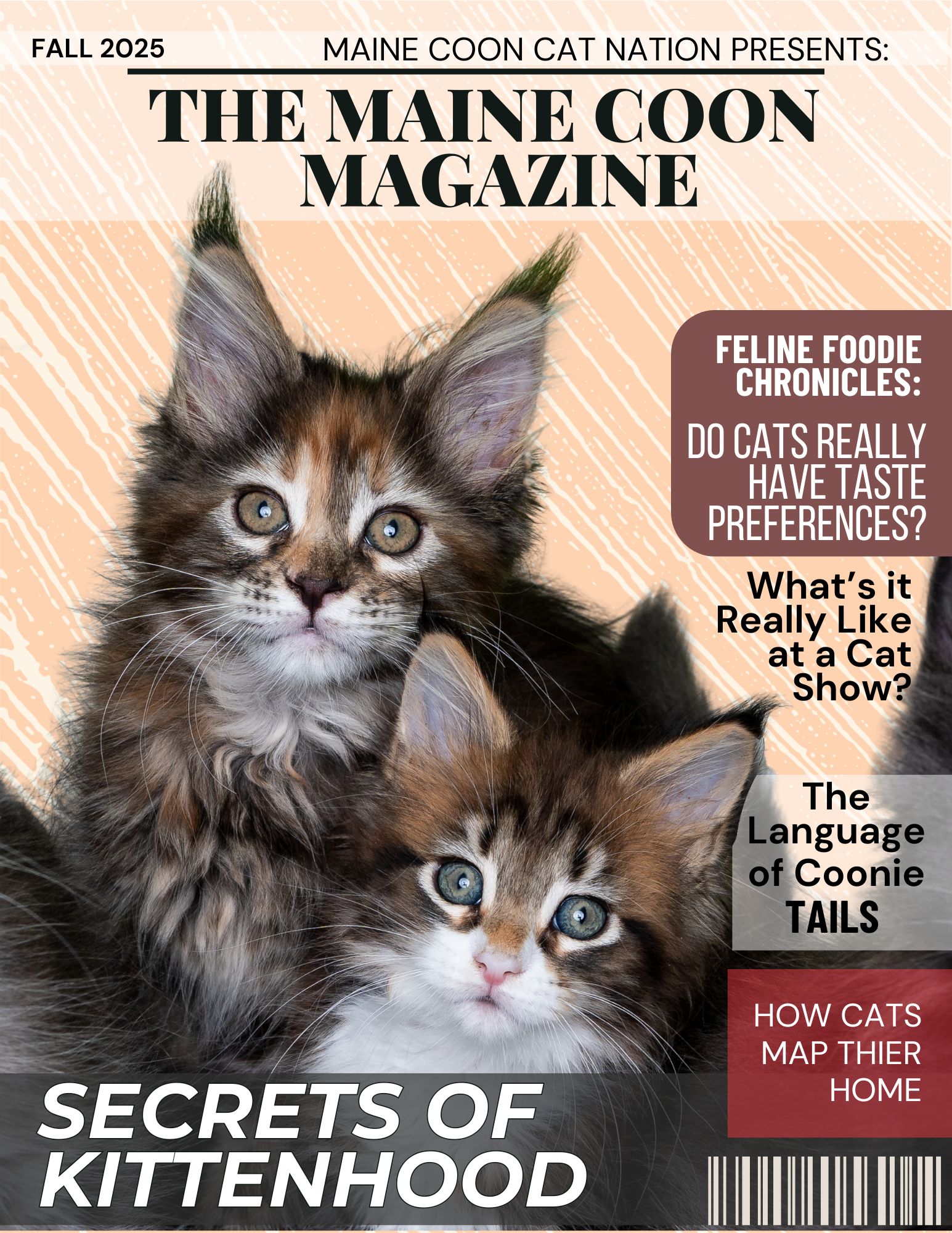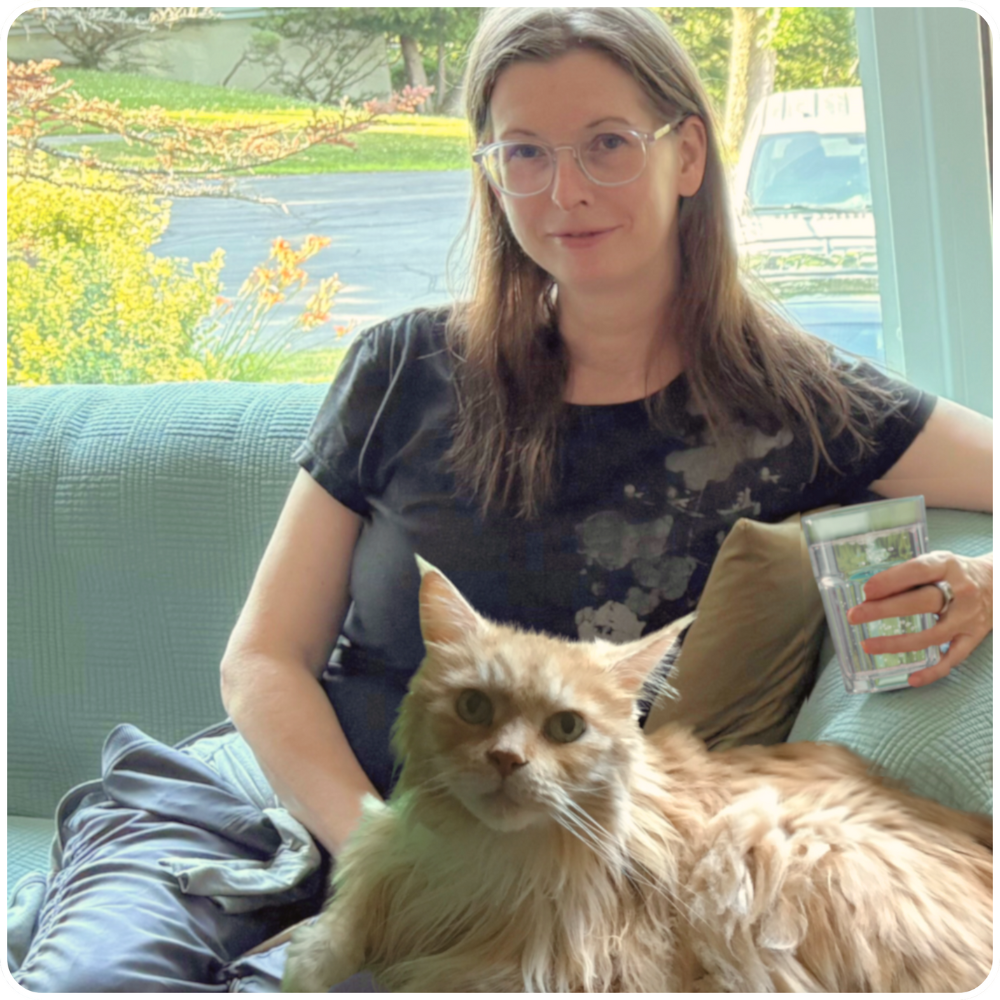- Home
- Maine Coon Kittens
- Maine Coon Kitten Personality
Inside the Maine Coon Kitten Personality: Traits & Behavior
•
If you've ever met a Maine Coon kitten, you already know they're full of personality from day one.
Big paws, bright eyes, and a sense of curiosity that seems to double every week.
They're playful, confident, and often more people-focused than you'd expect from a young cat.
If you like this, you'll love our fun, free Daily Digest!

If you like this, you'll love our fun, free Daily Digest!

These kittens don't just dart around the house! They watch, learn, and join in.
They might chase toys across the floor one minute, then quietly study you from the next room as if taking notes.
In short, they're active and social but not wild. They strike a rare balance of kitten energy and calm curiosity that hints at the gentle, loyal companions they'll grow up to be.
Playful by Nature
The Maine Coon kitten personality shines brightest during play. They're quick, curious, and never short on ideas for fun.
A fallen pen becomes a toy, a paper bag turns into a fort, and a hallway transforms into their personal racetrack.
They love interactive games, especially when you’re part of them. A feather wand or rolling ball is enough to spark full-speed sprints that end in an impressive sideways leap.
You can almost see the thought process behind those big eyes - they're not just reacting, they're thinking.
These kittens play hard, then crash even harder. One minute they're chasing a toy with Olympic-level focus, and the next they're sound asleep, usually on your lap or behind your head on the couch.
That back-and-forth rhythm between wild play and deep naps is part of what makes life with them so entertaining.
Their curiosity means they'll "help" with nearly everything! Whether it's laundry, dishes, or typing!
And while it can be chaotic, it’s also how they learn the world around them. That constant engagement is a clue to their intelligence and their love of being involved in daily life.
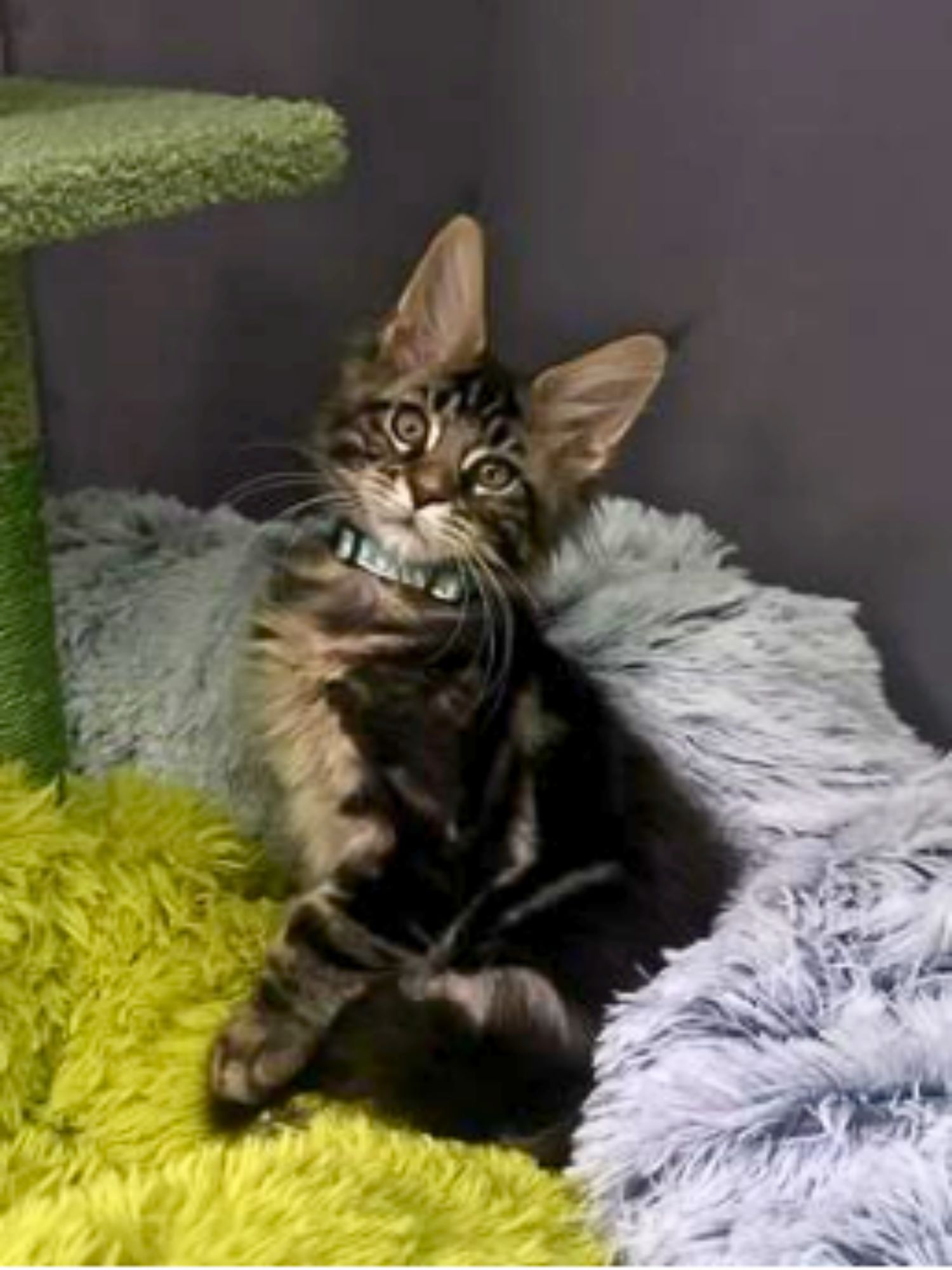
Darla in Missouri shares: "Kong is lovable, expressive, intelligent, and altogether lovely.
He acts like no other cat I’ve ever been around! I enjoy watching him play as much as I do holding and petting him."
That Social Personality
One of the first things you’ll notice is how people-oriented these kittens are.
They like being where the action is, even if they're not directly involved. If you leave the room, there's a good chance they’ll trot after you to see what's next.
That social streak means they benefit from regular interaction. Talking to them, playing together, or simply letting them hang out nearby helps them feel secure and connected.
They're not demanding, just quietly invested in whatever their humans are doing.
Early socialization matters too. Handling them gently, introducing household sounds, and letting them meet visitors helps shape their personality into the friendly, adaptable adult cat they'll become.
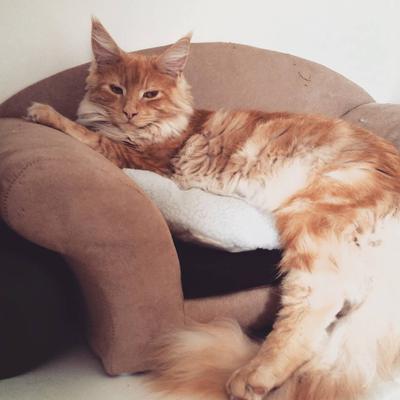
Laura in Surrey, United Kingdom says of her boy, Ted: "Brave, bold, and full of character from the start...
My family and friends call him 'the cat who thinks he’s a dog.' He greets me at the door like a dog, sits by the door when he wants outside, and even brings me his food bowl when it’s empty."
Micro-Expressions During Play
Maine Coon kittens don't just play - they rehearse the hunt. Those little facial shifts you see mid-pounce, like wide pupils or whiskers pushed forward, aren't random.
They're called micro-expressions, and they reveal what's happening behind the scenes as your cat’s brain switches into "hunt mode."
The eyes go first. As excitement builds, pupils dilate to capture every flicker of movement.
Whiskers follow, angling forward to help measure distance and detect air shifts from the toy's motion. Even the ears get involved, flicking in tight little movements to pinpoint sound.
Behaviorists note that play micro-expressions activate many of the same neurological pathways as actual hunting.
This is why play is such a vital outlet for indoor cats. It’s not just entertainment, it's instinctive exercise for both body and brain.
If you notice your Coonie freeze or twitch their tail just after a play session, that's the final "reset" moment of the sequence.
It's their way of completing the cycle, just as a wild cat would after a successful catch.
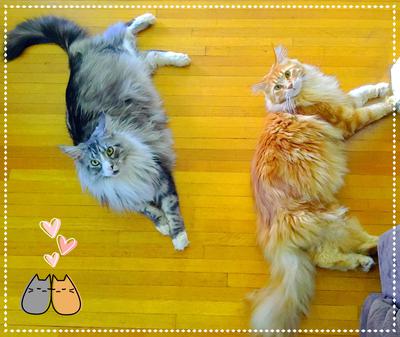
Gryphon and Taun Taun belong to DeanAnn and Dave in NY and their style of play is so fun!
Gryphon "often plays "tricks" on his brother (luring him into a pretend attack situation!).
He can catch toys with his paws and play fetch! They sometimes play the game "Who's That Cat", where they briefly have amnesia and freak out at the sight of one another.
Then just as quickly they realize,'Oh yeah, I know you...I see you everyday, all day long.' "
Building Trust Through Play
Every leap, pause, and head tilt during play helps build something bigger - trust. These moments teach your confident kitten that you're safe, predictable, and fun to interact with.
When you respond to their cues by slowing down when they hesitate or matching their playful rhythm, they start to read you back. That give-and-take is how strong bonds form.
Playtime isn't just exercise; it's communication practice. You're helping them learn confidence, boundaries, and that human hands are for affection, not fear.
The result is a cat that grows up feeling secure, expressive, and deeply connected to you.
Growing Into Their Personality
The personality quirks you see now, like those determined little "hunts," the fascination with running water, the habit of sleeping on your paperwork - are early glimpses of who they'll become.
As they mature, that curiosity mellows into confidence, and the playful spark turns into gentle companionship.
Many owners say their Maine Coons seem to "grow into their personality" just as much as their size. The affection, loyalty, and quiet humor that start in kittenhood become the traits that define them for life.
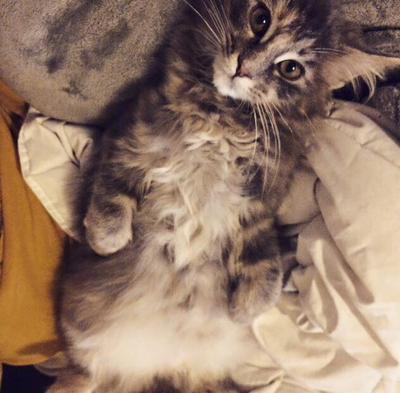
Arianna in Boston tells us about Amelia's Maine Coon kitten personality: "the funniest, most energetic, and sweetest 5-month-old kitten... Amelia loves cuddling on our chests while we watch TV, sometimes for hours.
Her favorite hobby is helping mom with work by trying to catch the mouse (these modern cats!)."
When Growing Confidence Looks Like "Alpha" Behavior
"Less cuddly" + personality shift: What some owners call "new alpha behavior" is usually not dominance in the strict sense, but a developmental confidence surge.
Here's what’s actually going on:
When kittens hit a certain age, often somewhere between 5-9 months, their brains and bodies finally sync up.
They're no longer bumbling babies, but they also aren't socially polished adults yet. Strength increases, coordination improves, and curiosity spikes. And with that comes testing.
They start:
- claiming space
- interrupting other household cats
- inserting themselves into everything
- walking through rooms like they own the place
- deciding they initiate play, attention, or interaction
To humans, this reads as "bossy" or "alpha," but to them, it's just practice!
This phase often coincides with:
- pulling back from cuddling
- shorter tolerance for handling
- more physical play
- sudden boldness or pushiness
Not because bonding has weakened, but because independence is strengthening.
Socially confident cats don't cling. They orbit. They choose when to engage. That’s why owners often say, "He used to be glued to me, and now he’s… different."
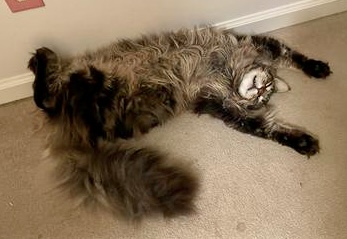
For example, Nelson in Nashville says of his boy Tintin: "nearing adulthood, he's become more independent, especially during "hunting" hours..
crazy. He’s still playful and friendly, but not the cuddly kitten he used to be. These days, he's more independent.."
Add other cats into the mix and it gets louder. The confident youngster may challenge routines, initiate rougher play, or ignore subtle social cues. Again, not aggression. They're learning boundaries by overshooting them.
The reassuring part: this phase usually levels out, especially when:
- routines stay predictable
- boundaries are consistent
- play outlets are appropriate
- forced affection is avoided
Many of these cats circle back to being affectionate later, just in a more self-directed way.
If you frame this as a confidence milestone instead of a personality loss,
FAQ: Common Questions About Maine Coon Kittens
Where do I get one?
Where do I get one?
The best place to start is with a responsible breeder who focuses on health, temperament, and early socialization.
You'll find guidance on what to look for in our article on finding a reputable Maine Coon breeder.
Adoption is also an option. Rescues and rehoming programs sometimes have young cats that share many of the same qualities.
How much do they cost?
How much do they cost?
Prices vary depending on lineage, color, and breeder reputation, but you can expect to pay in the thousands. We've broken down what affects that range in our page on Maine Coon cost and pricing.
How long do they stay in the "kitten" stage?
How long do they stay in the "kitten" stage?
This breed matures slowly. They'll keep their playful energy for years, often not reaching full size or settling into adult personality until age three or four.
Do they get along with other pets?
Do they get along with other pets?
Generally, yes! Early introductions and a calm environment help a lot.
Their social nature makes them more tolerant than most cats, especially when raised around other animals.
Are they easy to train?
Are they easy to train?
They're one of the easiest cat breeds to teach simple commands and routines. Short sessions and positive reinforcement work best. These kittens are clever enough to connect the dots quickly.
« See more about early growth, care, and personality in our main hub for Maine Coon kittens - from milestones and colors to what to expect as they grow.
